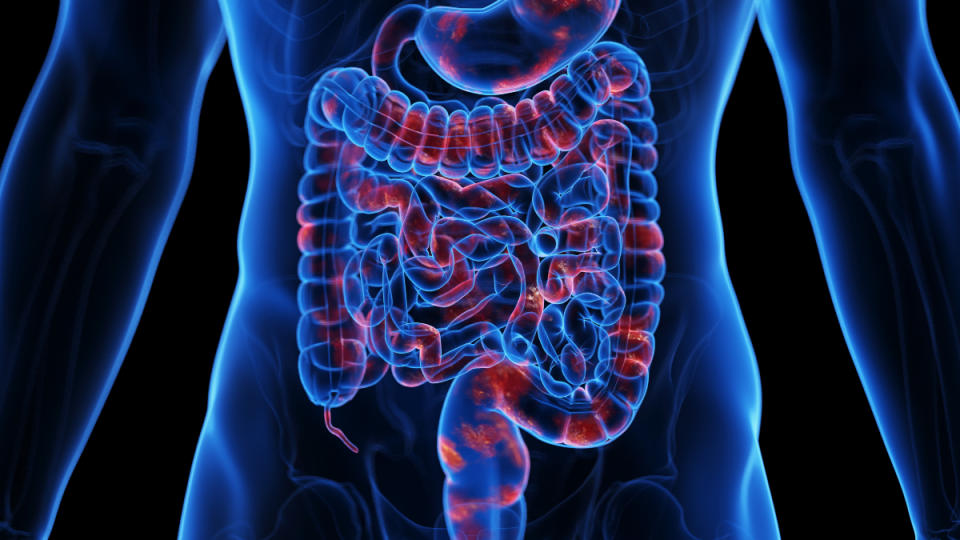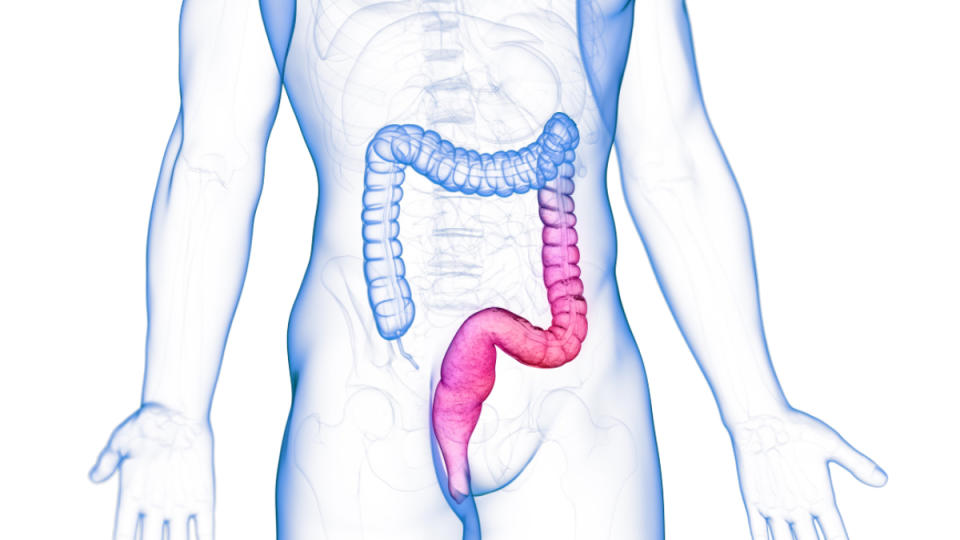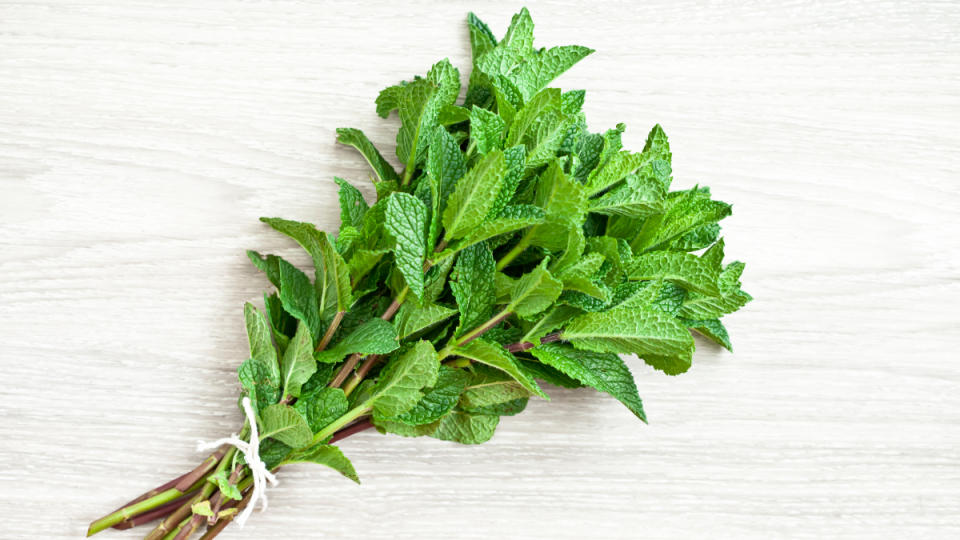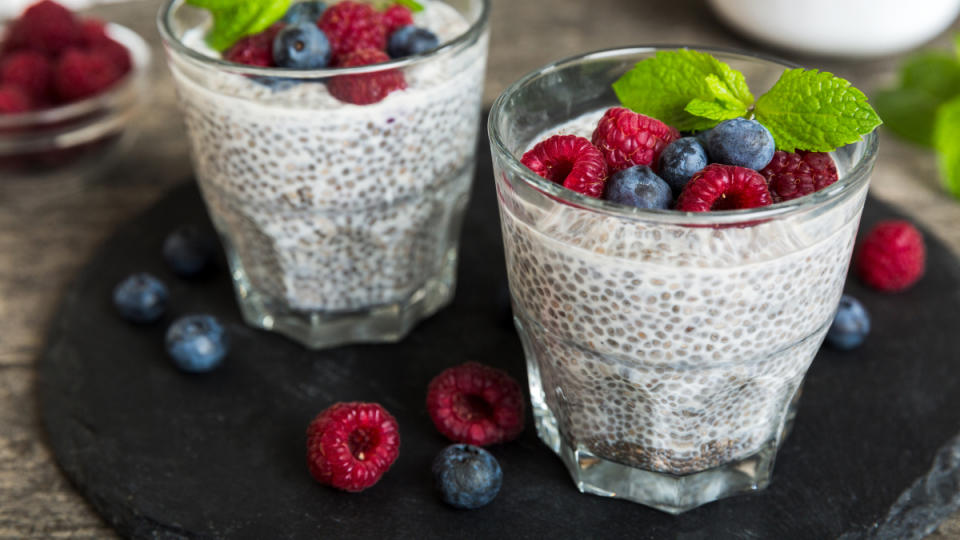Is Your GI Upset IBS or IBD? Doctors Reveal How To Tell — And Which One Can Be Serious
When GI upset strikes, it's often a sign of a simple stomachache. But when the issue becomes more recurrent, it can be a question of IBD vs. IBS. Irritable bowel syndrome (IBS) affects between 25 and 45 million Americans. Inflammatory bowel disease (IBD) affects about 3.1 million folks.
“These are very common conditions affecting the gastrointestinal tract,” says Ekta Gupta, MBBS, associate professor of medicine and director of endoscopy at Johns Hopkins Medicine. “They have similar symptoms of abdominal pain, bloating, diarrhea or constipation.”
Though IBD and IBS may share symptoms, they are very different conditions with different treatments. Here’s what you need to know when it comes to IBD vs. IBS, plus the best ways to get your digestive system back on track.
IBD vs. IBS
If you’re having any stomach symptoms that are unusual, it’s important to visit your doctor. “It’s very easy for IBD patients to think they have IBS and delay treatment because they think it’s not that serious," cautions Dr. Monzur. "But untreated IBD puts you at risk for worsening disease, surgery, post-surgical complications and even colon cancer." It's can be easy to confuse the two conditions, but here's how they differ.
Understanding IBD
In looking at IBD vs. IBS, inflammatory bowel disease is a lot more concerning to doctors. “Inflammatory bowel disease is all about chronic inflammation of the gastrointestinal (GI) tract, which runs from the mouth through the anus," says Farah Monzur, MD, clinical assistant professor of medicine at Stony Brook University Hospital. "A patient with IBD will have redness, swelling, ulcers or some sort of inflammation we can see."
IBD is an autoimmune disease that causes the immune system to attack your body. “We don’t actually know what causes IBD," says Janese Laster, MD, a gastroenterologist in private practice in Washington, DC. "There may be a genetic disposition. It could be a change in diet or environmental exposures that trigger it."
Symptoms of IBD include:
Diarrhea
Blood in stool
Abdominal pain
Joint pain
Weight loss
Vitamin deficiencies
IBD is a broad category of disease. If you have IBD, you’ll be diagnosed with either Crohn’s disease or ulcerative colitis.
What is Crohn’s disease?
Crohn's disease can affect any part of the GI tract, with patches of inflammation scattered throughout. It can also cause narrowing of the intestines in spots, which can block the flow of food. What's more, people with Crohn's have a high risk of fistulas — holes between the intestine and other organs or body parts. “Plus, Crohn’s patients have a greater likelihood of bowel obstructions and vitamin and nutrient deficiencies compared to ulcerative colitis,” says Dr. Laster.

SEBASTIAN KAULITZKI/Getty
What is ulcerative colitis?
With colitis, patients get inflammation in the large intestine or colon. Unlike Crohn's, which can involve any part of the GI tract, colitis only happens in the colon. It also tends to be a single area of inflammation. But this chronic inflammation can damage the colon and lead to life-threatening complications in severe cases.

SEBASTIAN KAULITZKI/Getty
Understanding IBS
Unlike IBD, there’s no inflammation with IBS. “When we look at the digestive tract with endoscopy or colonoscopy, we don’t see anything,” says Dr. Monzur. It’s not life-threatening, but IBS causes many symptoms that can make life miserable.
“Its primary symptoms are abdominal pain and changes in bowel habits, including constipation and/or diarrhea," Dr. Gupta explains. "This can be driven by the brain-gut connection, where stress and anxiety can also trigger real gastrointestinal symptoms." That means there’s a strong mental health component to IBS vs. a lack of one in IBD. In IBD, stress doesn’t cause flare-ups, though many patients think it does. “That’s because a lot of people who have IBD also have IBS,” says Dr. Monzur. (Click through to learn how vagus nerve exercises help tame chronic stress.)
Symptoms of IBS include:
Abdominal pain
Bloating
Changes in bowel movements
Sometimes people with IBS see blood in the toilet bowl, but it’s because of hemorrhoids, says Dr. Monzur. Unlike with IBD, where the blood is mixed in with the stool and sometimes turns it black, blood due to hemorrhoids from IBS will typically be bright red. Experts agree, though: Any blood with a bowel movement warrants a call to your doctor.
There are three types of IBS:
IBS with diarrhea (IBS-D)
IBS with constipation (IBS-C)
IBS-mixed (IBS-M)
As with IBD, the causes of IBS remain a mystery. “If we knew what caused it, we’d have a cure,” says Dr. Monzur.
The best IBD home remedies
IBD is a serious illness vs. the more manageable IBS. If diagnosed with IBD, your doctor will prescribe medication that helps control the inflammation. In addition to following your doctor’s advice, there are some natural ways to curb inflammation and ease your symptoms.
A smart start: Following an anti-inflammatory diet with fruits, vegetables and fish. “I always try to get people off highly processed foods,” says Dr. Laster. Stress reduction, getting enough sleep and exercise all boost your health and ease inflammation, too.
Another way to thwart GI upset is by avoiding certain foods that contribute to inflammation during an IBD flare. “Do not eat seeds or produce skin," Dr. Gupta says. These don’t break down fully during digestion and can irritate the GI tract. Instead, Dr. Gupta advises eating low-fat and low-fiber foods. When you're not experiencing a flare up, though, Dr. Laster says a high-fiber diet can help aid digestion.
The best IBS home remedies
For those with IBS, the good news is that it's easier to tame symptoms without the need for meds. These are the best natural options:
1. Supplement with mint
“Peppermint reduces spasms in the colon," explains Dr. Laster. "People with IBS can be sensitive to these sensations, and peppermint reduces that sensation." If you start to notice trouble brewing, reach for a peppermint capsule to quickly quash symptoms. One Dr. Monzur recommends: IBgard Gut Health with Peppermint Oil (Buy from Amazon, $72.99 for two packs).

2. Snack on kiwis
This high-fiber fruit eases constipation that can occur with IBS, says Dr. Monzur. In fact, a study in The American Journal of Gastroenterology showed that eating two kiwis daily increases bowel movements and eases stomach discomfort. Not a fan of kiwi? Other good food cures for constipation include berries and prunes.
Related: Is Yogurt Good for Constipation? Yes — And So Are These 9 Other Foods
3. Sip ginger tea
The warming spice makes a delicious cup. And every soothing sip helps calm an IBS flare up. “It helps ease nausea," Dr. Laster explains. "I like slices of fresh ginger steeped in hot water, like a tea." Or you can try a bagged brew, such as Traditional Medicinals Organic Ginger Tea (Buy from Amazon, $4.92). (Click through to see why fennel tea is good for digestive health, too.)
4. Savor chia pudding
Chia seeds promote healthy digestion and can ease symptoms in both IBS-C and IBS-D, according to Dr. Laster. While seeds like chia seeds are usual a no-go for patients with IBD, they can help those with IBs. For a quick fix, you can soak 1 Tbs. chia seeds in at least 12 oz of water for 10 minutes and drink once daily.
Or for a tasty treat, whip up some overnight chia pudding. Simply combine 2 Tbs. chia seeds and 1/2 cup milk or almond milk in a jar and mix well. You can add a small drizzle of honey, if desired. Refrigerate at least two hours or overnight, then top with your favorite fruit and enjoy.

5. Supercharge your smoothie
Adding a scoop of psyllium husk to your morning smoothie helps keep IBS flares at bay. Psyllium husk is the main ingredient in some brand-name fiber powders, but Dr. Laster prefers the single-ingredient powder to other choices. “The commercial ones have filler ingredients you don’t need,” she says.
It's so effective, a review in Current Opinion in Gastroenterology recommends psyllium husk for all IBS patients. For those with IBS-C, the psyllium adds bulk to stools, helping them move through the system faster. That same property helps ease the watery stools that cause diarrhea in those with IBS-D. (Click through to learn how psyllium husk aids weight loss, too.)
6. Try a low FODMAP diet
A low-FODMAP diet restricts fermentable carbohydrates known as FODMAPS, such as onions, garlic and wheat, which can trigger GI upset. Common foods that fit the guidelines of a low-FODMAP diet are rice, chicken and carrots. And the good news is that research supports the strategy: A review in Neurogastroenterology found that people who followed a low-FODMAP diet experienced a greater improvement in their IBS symptoms than those who tried other types of interventions.
7. Practice mindfulness
According to a study in Neurogastroenterology and Motility, more than 70% of IBS patients who did an 8-week mindfulness-based stress reduction course experienced relief from symptoms. Not sure where to get started? Check out the 5-minute beginner-friendly video below.
Also smart: checking in with a therapist to help you let go of your worries. “Cognitive behavioral therapies and learning coping mechanisms to manage stress can ease symptoms,” explains Dr. Gupta. (Click through to learn how stress can cause diarrhea — and how to stop it.)
Need extra help?
While lifestyle tweaks are a great first step toward easing symptoms, some folks with IBD or IBS may need an extra helping hand.
Prescriptions medications for IBD
IBD needs to be managed medically. It’s possible to go into remission, but IBD can’t be cured. Currently, there are several categories of medications used to treat and manage IBD, according to Dr. Gupta:
Corticosteroids: These powerful anti-inflammatory drugs offer short-term symptom relief. They’re often a bridge to longer-term treatment.
5-aminosalicylic Acid Medications (5-ASAs): Available as pills, enemas and suppositories, these drugs reduce inflammation in the lining of the intestines to relieve symptoms. They’re for mild to moderate IBD only.
Immunomodulator medications: These drugs turn down an overactive immune system to ease symptoms. Sometimes they help people go into remission by decreasing inflammation.
Biologic therapies (biologics): This class of drugs also targets the immune system to calm inflammation and provide relief.
Prescription medications for IBS
Often, IBS can be well managed without the need for a prescription at all. But if natural remedies aren't quite cutting it, your prescription options include:
Antidepressants: “These can address the gut-brain connection,” says Dr. Gupta.
Anti-spasmodic drugs: These medicines help ease the pain that comes with sensations in the gut, especially if, like many people with IBS, you’re extra sensitive to them.
Anti-diarrhea: These drugs can curb frequent emergency bathroom visits.
For more ways to soothe common GI bothers:
Fennel Tea Can Ease Bloat, Calm Stress + Boost Sleep — How to Brew It for Pennies
Doctors Break the Silence on Stress and Diarrhea: What They Want You to Know
Is Yogurt Good for Constipation? Yes — And So Are These 9 Other Foods
This content is not a substitute for professional medical advice or diagnosis. Always consult your physician before pursuing any treatment plan.
Woman's World aims to feature only the best products and services. We update when possible, but deals expire and prices can change. If you buy something via one of our links, we may earn a commission. Questions? Reach us at [email protected].
